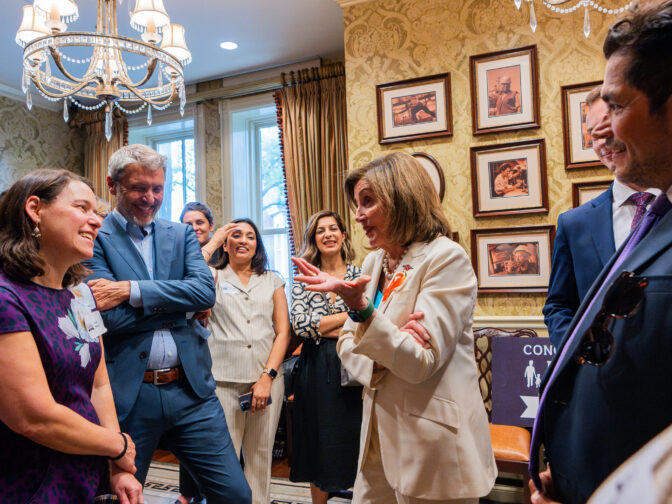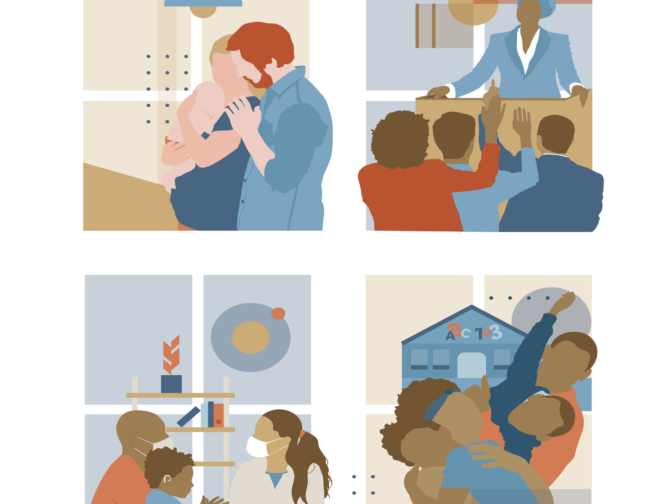Centering care and building gender equality between couples, particularly through better paternity and parental leave, was the main theme of the UK launch of the latest State of the World’s Fathers report, held in the House of Lords on November 16.
The event was opened by Baroness Barker, who began by welcoming this, the fifth report, and the third to be launched in the UK Parliament. The Baroness shared her hope it would help to recognise the increasing diversity of both fatherhood and parenthood in the UK and the challenges they present. She was also keen to acknowledge a recent win for women’s rights in the UK – that from 17 November, women will finally be allowed to access contraception from a local pharmacy rather than from a doctor.
The Baroness then introduced the first speakers – Gary Barker, CEO of Equimundo, and Nikki van der Gaag, lead author on the report, to present its findings. Their presentation began by reflecting on the importance of care to all our lives – on average, we spend 30% of our time giving care. Not only this, but as the report reveals caring for others makes us happier: men and women who are satisfied with how involved they are in raising their children are 1.5 times as likely to agree that “I am the person I always wanted to be” and to feel a sense of gratitude.
The data also shows that while women are still doing more care of all kinds than men, the gap is slowly narrowing in many countries. Barker outlined the ambition of MenCare, a global fatherhood campaign active in more than 100 countries on five continents: to engage men as allies in supporting women’s social and economic equality, and as part of this, for men to commit to carrying out 50 percent of the world’s childcare and domestic work.
The authors noted the importance of structural as well as individual change in relation to care. In the report, more than 50% of both mothers and fathers said that political activism for care leave policies was important to them. “Investing in care, and in a care economy, is key,” van der Gaag said. Care policies consistently demonstrate positive returns on investment, at a rate of three to one, and care represents up to a quarter of GDP in some countries. The UK is failing, both in terms of paternity leave and in terms of childcare, which consumes a larger share of parents’ earnings compared to any other OECD country.
Joeli Brearley from the charity group Pregnant then Screwed, which works to end the motherhood penalty (the discriminatory consequences to mothers in terms of loss of earnings and reduced promotion opportunities for growing their families while in the workforce), picked up on the vital importance of paternity leave, which in the UK is only two weeks. She said that in her nine years running the organization: “I can honestly say I have never met a single mother who didn’t seriously struggle in the early days after giving birth. What she needed more than anything was the support of her partner.” Brearley talked about the benefits of paternity leave for mothers, fathers and children, and showcased recent research her organisation had carried out with the Centre for Progressive Policy which revealed that countries with six weeks’ leave for fathers had a 4% smaller gender pay gap and a 3.7% smaller labour force participation gap, as well as seeing improvements in parents’ mental health. Finally, Brearley gave a robust critique of the current UK offer for fathers – “the least generous in Europe” – and of Shared Parental Leave – which is unavailable to around 40% of fathers, and so complex and unaffordable that only 2% of eligible working fathers and second parents take it up, and requires mothers to give up a portion of their own leave. “Our current system fails us all,” she said, “and we know what works. We need to ring-fence fathers’ leave and pay it at a decent percentage of salary.”
Jeremy Davies from the UK’s Fatherhood Institute talked of his organisation’s vision for positive, involved fathers, which leads to positive outcomes for children, and endorsed Brearley’s call for six weeks’ well-paid leave for fathers in their baby’s first year. The Fatherhood Institute has a Parliamentary petition calling for two weeks’ paternity leave and a dedicated ‘daddy month’ of parental leave, all paid at 90% of salary. “There is a fundamental problem in UK policy, which is that fathers are positioned as earners and not caregivers. And that is what we want to change.” He dismantled the myth that dads are often not around: 95% of fathers in the UK attend their baby’s birth; 95% jointly register the birth; when their child is aged five, 94% of fathers are either living with or in contact with them; and by the time their child is aged 17, this percentage has only fallen to 85%. He noted that while UK fathers are still much more likely to work full-time, and to work long hours outside the home, the ratio of time working fathers spend on unpaid childcare compared to working mothers has risen hugely – from under 15% in 1961, to 54% in 2014, to a peak of 88% during the pandemic (2020). In 2022, thanks to increased working-from-home, working fathers were spending 65% as much time as working mothers on unpaid childcare. “If we want fathers to do more at home, we need to let them spend more time there,” he argued, laying out ten recommendations to improve gender equity by supporting fathers.
Marvyn Harrison, founder of the group Dope Black Dads, spoke movingly of his own experience, and of how he set up the organisation to support other Black fathers like himself to be good dads. “As Black guys we do not have the same access and abilities to be able to hold space in the same way. My white friends don’t have the same informational code to share in the context of my spaces. I am alone. So very often I turn to Black mothers, who have more healthy information about being a dad than Black men.” He said that “Black men find it easier to be outside their families than inside their families,” and spoke of his own route back into his family, “peacefully and without being oppressive.”
The discussion from the packed audience was lively, and included questions about non-binary parents, about culture change, positive examples from the Global South, financial barriers, and about whether six weeks’ statutory leave for fathers was ambitious enough. The panel noted that in the current context, where campaigns for more leave had been going on for 20 years, six weeks was ambitious but also feasible. Gary Barker noted that in the context of the Nordic countries, where they offer up to a year’s leave for each parent, that “it sounded unimaginable in the 1970s but now no politician of any party is against it. They are closer to equality than almost any other countries and have seen the benefits in terms of women’s employment and GDP growth. It is possible – and they are not going broke.”
The audience’s engagement in the issue was clear, as was the commitment to centering care and improving paternity leave in the UK as part of this. The Baroness concluded by saying, “For those of us who spend our days trying to counter right wing backlash, it is important to recharge our batteries like this for policies of enlightenment,” and reiterated the importance of sharing the care. In the words of recent Nobel Prize winning economist, Claudia Goldin, quoted by Brearley: “We are never going to have gender equality, or narrow the pay gap, until we have couple’s equity.”




